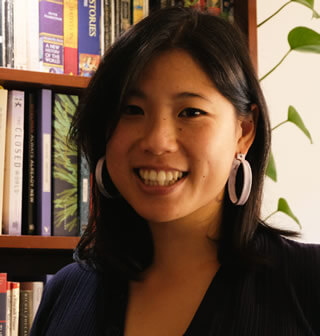
Mullins Prize 2019: Thao Phan
Amazon Echo and the Aesthetics of Whiteness (2017 Catalyst: Feminism, Theory, and Technoscience)

Amazon Echo and the Aesthetics of Whiteness provides a feminist analysis of the home automation device Amazon Echo and its digital assistant Alexa (released in the United States and internationally 2015-2017). Phan makes the case that the Echo (despite having a white voice) is modeled on an idealized image of domestic servants — rather than on the figure of the housewife, as previous analysts have argued. Phan points to many problems with this figuration, including both its historical confusion and the way it stages and occludes power dynamics between uses and devices. The former dehistoricizes and depoliticizes the servant/master relation, eliding racialization and the historic reality of the bourgeois middle-class home as a site of exploitation. The latter makes the Echo an anti-politics machine that uncercuts awareness of the politics of digital labor and surveillance. Phan’s analysis provides a sharp reading and critique of the ways smart homes, digital labor and their gendering are usually figured (in scholarship as well as advertising)– showing how these reproduce both binary gender logics and white supremacy.
The 2019 Mullins Prize committee consisted of Joan Fujimura (University of Wisconsin) and Kim Fortun (chair) (University of California Irvine).
Acceptance Statement
I am very honoured to receive the Nicholas C. Mullins Award for my article, Amazon Echo and the Aesthetics of Whiteness. I am especially proud to share it with the journal, Catalyst: Feminism, Theory, Technoscience, a publication that has strongly supported junior feminist STS scholarship, including my own. I would like to thank my generous readers: Timothy Neale, Thomas Sutherland, Gilbert Caluya, and Scott McQuire, the Australian Government Research Training Program for providing me with a scholarship to conduct this research, and the Catalyst editors and peer-reviewers for their valuable feedback. I would additionally like to thank my local STS community in Melbourne, the Deakin Science and Society Network and AusSTS Grad Network, and especially Emma Kowal and Tim Neale for their unwavering support. I am, of course, incredibly grateful to the 4S organisation and the prize committee for their ongoing commitment to recognising STS scholarship from around the world.
Bio
Thao Phan is a Research Fellow at the Alfred Deakin Institute for Citizenship and Globalisation. She is completing her PhD at the University of Melbourne in the Media and Communications program. She is a feminist STS researcher who specialises in AI, gender, and algorithmic culture. Her research examines the co-figuration of AI and gender in scientific history, popular culture, and everyday life. In 2015, Phan edited and published the Introduction to a special issue of Platform: Journal of Media and Communication for the thirty-year anniversary of Donna Haraway’s Cyborg Manifesto. In 2019, Phan co-edited An Anthropogenic Table of the Elements for the Society for Cultural Anthropology’s online series, Theorizing the Contemporary.
